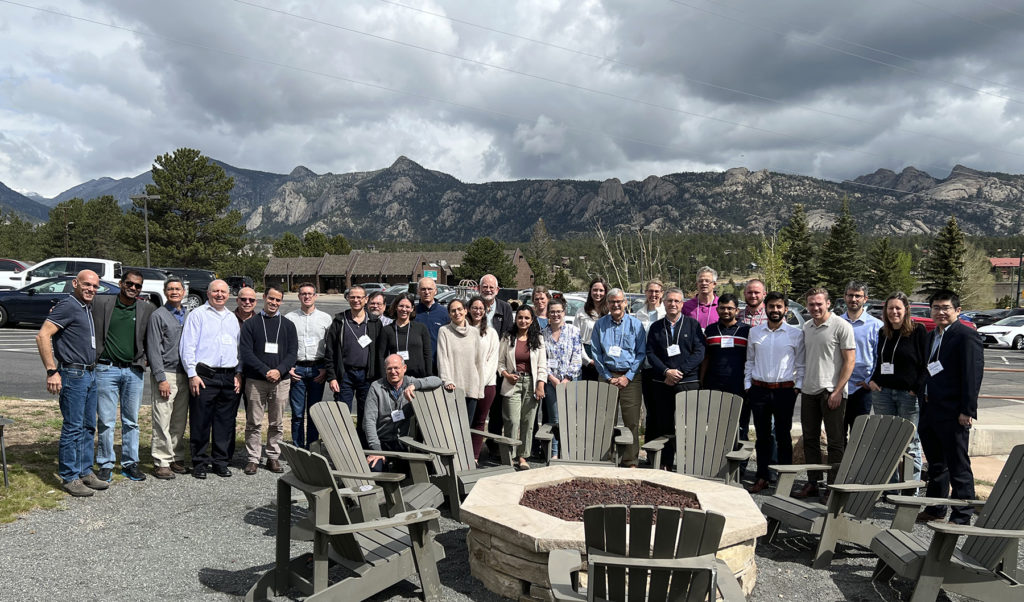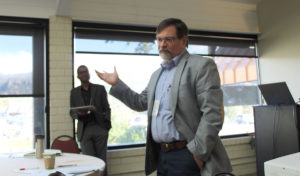
Israel and the western U.S. have similar semi-arid climates and a common interest in water sustainability, which brought engineers and scientists from Colorado State University and Israel together with policy experts in May to collaborate on solutions for water scarcity.
The Sustainable Agricultural Water Workshop, held May 22-25 at the Ridgeline Hotel in Estes Park, established a binational, transdisciplinary think tank to address policy, quality and quantity issues related to agricultural water. Their goal: to tackle agricultural water problems holistically through an integrated, systems-level approach.
Organizers from CSU, Technion – Israel Institute of Technology, and the Hebrew University of Jerusalem hope the SAW Workshop will foster collaborations and bridge gaps among disciplines and stakeholders, including regulators, industry and academia.
“This workshop allowed us to think reflectively on the challenges and opportunities for sustainable agricultural water,” said organizer Karan Venayagamoorthy, a professor in the Department of Civil and Environmental Engineering and Associate Dean for Academic and Student Affairs. “We are excited about the collaborative adventures that lie ahead between the various groups that participated in the workshop.”
Speakers included officials from the U.S. Department of Agriculture, U.S. Environmental Protection Agency, Foundation for Food and Agriculture Research, and Israel Water Authority.
‘We are running out of fresh water’

In opening remarks, Thomas Borch, an organizer of the event and professor in the Departments of Soil and Crop Sciences, Chemistry, and Civil and Environmental Engineering, urged attendees to think about alternatives to fresh water, and also the legal, social and health implications of using recycled or treated water.
“Israel is already doing things that perhaps in the near future we’ll see more of in the U.S.,” Borch said. “They do not irrigate with a lot of fresh water because they don’t have a lot of fresh water.”
Borch pointed out that water law in the U.S. sometimes prohibits reuse of water. Civil and Environmental Engineering Professor Neil Grigg touched on Colorado’s complex water law in his talk about the state’s water management history.
Guy Reshef, deputy director general with the Israel Water Authority, discussed Israel’s efforts to reduce their use of natural resources. Fresh water accounted for 90% of the country’s total consumption in 2003 and now amounts to 50% of its water sources. Half of Israel’s water now comes from treated wastewater and desalinated brackish and sea water.
Allan Andales, a professor in the Department of Soil and Crop Sciences, spoke about the Irrigation Innovation Consortium, a collaboration of industry leaders and five universities whose goal is developing and promoting advanced irrigation technologies. The consortium is funded by the Foundation for Food and Agriculture Research, which was represented at the workshop by keynote speaker Kathleen Boomer.
The workshop was funded by the U.S.-Israel Binational Agricultural Research and Development Fund, with additional funding from CSU’s Office of the Vice President for Research. The event originally was scheduled for September 2020 but was postponed several times due to the pandemic and related travel restrictions.
Speakers included:
• Kathleen Boomer, Scientific Program Director of the Foundation for Food & Agriculture Research
• Guy Reshef, Deputy Director General and Head of Israel Hydrological Service Division, Israel Water Authority
• Neil Grigg, CSU professor of civil and environmental engineering
• Allan Andales, CSU professor of soil and crop sciences
• Thomas Borch, CSU professor of soil and crop sciences, chemistry, and civil and environmental engineering
• Benny Chefetz, Hebrew University of Jerusalem professor of soil and water sciences
• Adi Radian, co-organizer, environmental chemist, and Technion assistant professor
• Jim Ippolito, CSU associate professor of soil and crop sciences
• Andy Jones, Colorado water law attorney
• Dionysios Dionysiou, University of Cincinnati professor of environmental engineering
• Yael Dubowski, Technion associate professor of civil and environmental engineering
• Tiezheng Tong, CSU assistant professor of civil and environmental engineering
• Yael Mishael, Hebrew University of Jerusalem associate professor of soil and water sciences
• Timothy Gates, CSU professor of civil and environmental engineering
• Raphael Linker, Technion associate professor of civil and environmental engineering
• José Chávez, CSU professor of civil and environmental engineering
• Eran Friedler, Technion associate professor of civil and environmental engineering
• Avi Ostfeld, Technion professor of civil and environmental engineering
• Juan Sánchez, CSU visiting scholar from the University of Castilla La Mancha, Spain
• Ashley Harper, U.S. Environmental Protection Agency environmental protection specialist
• Steven Evett, U.S. Department of Agriculture Agricultural Research Service soil scientist
• Iddo Kan, Hebrew University of Jerusalem associate professor of environmental economics and management
Ten students or postdoctoral fellows from the U.S. and Israel also presented their research in a poster session on the second day of the event.